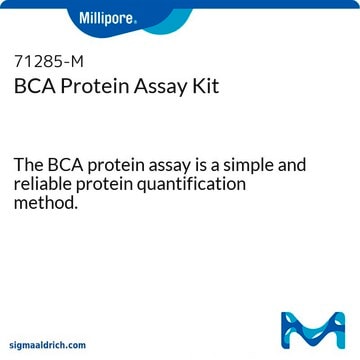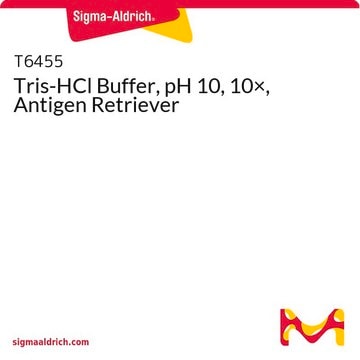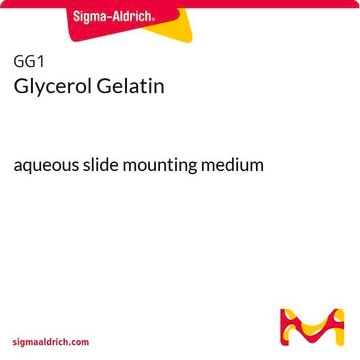GE80-6483-56
2-D Quant Kit
Cytiva 80-6483-56
Synonyme(s) :
2D Quantification Kit, Protein Quant Kit
Se connecterpour consulter vos tarifs contractuels et ceux de votre entreprise/organisme
About This Item
Code UNSPSC :
41105323
Nomenclature NACRES :
NA.25
Produits recommandés
Caractéristiques
wetted part: no
Fabricant/nom de marque
Cytiva 80-6483-56
Conditionnement
pkg of 500 assays
Température de stockage
2-8°C
Catégories apparentées
Description générale
2-D Quant Kit is designed for the accurate determination of protein concentration in samples prepared for electrophoresis techniques such as 2-D electrophoresis, SDS-PAGE, or IEF.
Common spectrophotometric methods of quantitating protein rely either on Coomassie dye binding or protein-catalyzed reduction of cupric (Cu2+) ion to cuprous (Cu+) ion. Dye-binding assays cannot be used in the presence of any reagent that also binds the dye. This includes carrier ampholytes and detergents such as PlusOne CHAPS, SDS, and Triton X-100. Assays that depend on the reduction of cupric ion cannot be used in the presence of reductants such as DTT, or in the presence of reagents that form complexes with cupric ion, such as thiourea or EDTA.
The 2-D Quant Kit procedure works by quantitatively precipitating proteins while leaving interfering substances behind. The assay is based on the specific binding of copper ions to protein. Precipitated proteins are resuspended in a copper-containing solution and unbound copper is measured with a colorimetric agent. The absorbance at 480 nm is inversely related to the protein concentration. The assay has a linear response to protein in the range of 0 to 50 μg and recommended sample volume is 1 to 50 μ.
Common spectrophotometric methods of quantitating protein rely either on Coomassie dye binding or protein-catalyzed reduction of cupric (Cu2+) ion to cuprous (Cu+) ion. Dye-binding assays cannot be used in the presence of any reagent that also binds the dye. This includes carrier ampholytes and detergents such as PlusOne CHAPS, SDS, and Triton X-100. Assays that depend on the reduction of cupric ion cannot be used in the presence of reductants such as DTT, or in the presence of reagents that form complexes with cupric ion, such as thiourea or EDTA.
The 2-D Quant Kit procedure works by quantitatively precipitating proteins while leaving interfering substances behind. The assay is based on the specific binding of copper ions to protein. Precipitated proteins are resuspended in a copper-containing solution and unbound copper is measured with a colorimetric agent. The absorbance at 480 nm is inversely related to the protein concentration. The assay has a linear response to protein in the range of 0 to 50 μg and recommended sample volume is 1 to 50 μ.
Caractéristiques et avantages
- Accurately determine protein concentration in the presence of 2% SDS, 1% DTT, 8 M urea, 2 M thiourea, 4% CHAPS, 2% Pharmalyte, and 2% IPG Buffer.
- Quantitatively precipitates proteins while leaving interfering substances behind.
- Linear response in the range of 0 to 50 μg protein, with recommended sample volumes of 1 to 50 μ.
Stockage et stabilité
Please be aware this product may be shipped 90 days before the expiration date. For more information on the batch specific expiration date, please contact technical service.
Remarque sur l'analyse
To view the Certificate of Analysis for this product, please visit www.cytiva.com.
Mention d'avertissement
Danger
Mentions de danger
Code de la classe de stockage
8B - Non-combustible corrosive hazardous materials
Faites votre choix parmi les versions les plus récentes :
Certificats d'analyse (COA)
Lot/Batch Number
Désolés, nous n'avons pas de COA pour ce produit disponible en ligne pour le moment.
Si vous avez besoin d'assistance, veuillez contacter Service Clients
Déjà en possession de ce produit ?
Retrouvez la documentation relative aux produits que vous avez récemment achetés dans la Bibliothèque de documents.
Les clients ont également consulté
Milan O Urban et al.
Frontiers in plant science, 12, 628167-628167 (2021-06-29)
The present study aims to investigate the response of rapeseed microspore-derived embryos (MDE) to osmotic stress at the proteome level. The PEG-induced osmotic stress was studied in the cotyledonary stage of MDE of two genotypes: Cadeli (D) and Viking (V)
Notre équipe de scientifiques dispose d'une expérience dans tous les secteurs de la recherche, notamment en sciences de la vie, science des matériaux, synthèse chimique, chromatographie, analyse et dans de nombreux autres domaines..
Contacter notre Service technique













![3-[(3-Cholamidopropyl)diméthylammonio]-1-propanesulfonate hydrate BioReagent, suitable for electrophoresis, ≥98% (HPLC)](/deepweb/assets/sigmaaldrich/product/structures/322/134/88b00489-fbbd-47b7-ba3e-430dd6a3c852/640/88b00489-fbbd-47b7-ba3e-430dd6a3c852.png)